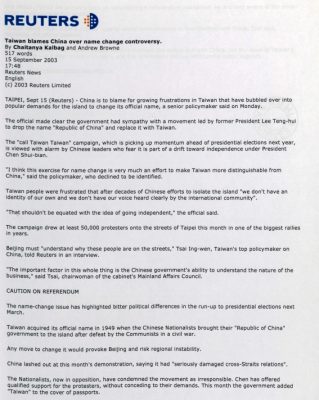Taiwan blames China over name change controversy
[Reuters]
Published date: 15th Sep 2003
15 September 2003
Reuters News
English
(c) 2003 Reuters Limited
TAIPEI, Sept 15 (Reuters) – China is to blame for growing frustrations in Taiwan that have bubbled over into popular demands for the island to change its official name, a senior policymaker said on Monday.
The official made clear the government had sympathy with a movement led by former President Lee Teng-hui to drop the name “Republic of China” and replace it with Taiwan.
The “call Taiwan Taiwan” campaign, which is picking up momentum ahead of presidential elections next year, is viewed with alarm by Chinese leaders who fear it is part of a drift toward independence under President Chen Shui-bian.
“I think this exercise for name change is very much an effort to make Taiwan more distinguishable from China,” said the policymaker, who declined to be identified.
Taiwan people were frustrated that after decades of Chinese efforts to isolate the island “we don’t have an identity of our own and we don’t have our voice heard clearly by the international community”.
“That shouldn’t be equated with the idea of going independent,” the official said.
The campaign drew at least 50,000 protesters onto the streets of Taipei this month in one of the biggest rallies in years.
Beijing must “understand why these people are on the streets,” Tsai Ing-wen, Taiwan’s top policymaker on China, told Reuters in an interview.
“The important factor in this whole thing is the Chinese government’s ability to understand the nature of the business,” said Tsai, chairwoman of the cabinet’s Mainland Affairs Council.
CAUTION ON REFERENDUM
The name-change issue has highlighted bitter political differences in the run-up to presidential elections next March.
Taiwan acquired its official name in 1949 when the Chinese Nationalists brought their “Republic of China” government to the island after defeat by the Communists In a civil war.
Any move to change it would provoke Beijing and risk regional instability.
China lashed out at this month’s demonstration, saying it had “seriously damaged cross-Straits relations”.
The Nationalists, now in opposition, have condemned the movement as irresponsible. Chen has offered qualified support for the protesters, without conceding to their demands. This month the government added “Taiwan” to the cover of passports.
On another highly sensitive issue – moves to pass a law allowing a referendum – Tsai of the Mainland Affairs Council struck a cautious tone.
China fears such a law would give the island’s 23 million people a way to vote for independence. “Referendum is something that is rather common in a democratic society,” Tsai said.
She added: “While we are very keen on establishing a referendum mechanism we are very aware of the cross- Strait implications of this exercise.”
Taiwan would never allow a popular vote on either independence or reunification with China, Tsai said,
repeating the official position.
Opinion polls show most Taiwan people want to maintain the status quo with China, but the issue of Taiwan’s name has struck a deep chord with many and the referendum bill has widespread public support.






